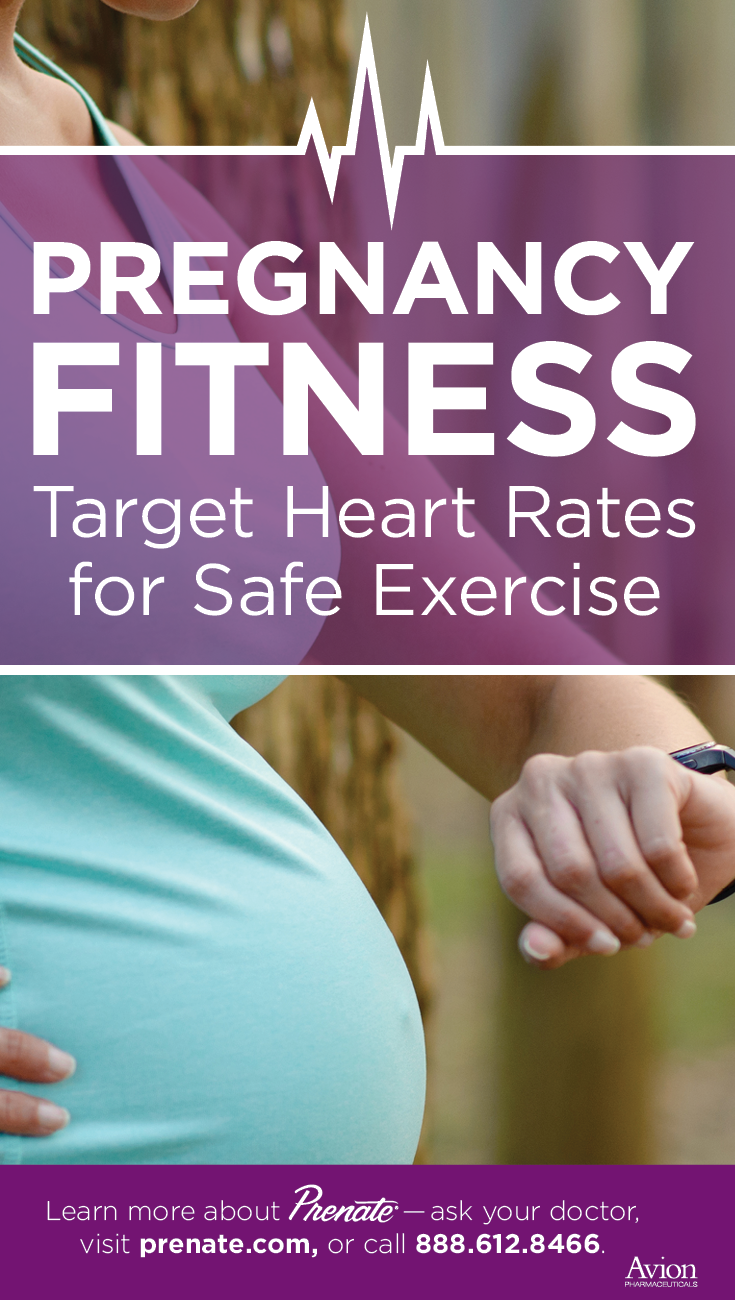Pregnancy Fitness: Target Heart Rates During Exercise
January 17, 2019
For healthy women, regular exercise during pregnancy has many benefits.1 If you’ve discussed an exercise program with your doctor and understand how it may affect you and your growing baby, you may also be wondering about your ideal heart rate targets before, during, and after exercise.
Should pregnant women be concerned about heart rate while exercising?
According to the Mayo Clinic, there’s no need to be overly concerned with your heart rate during exercise sessions while you are pregnant.2 You may have heard that pregnant women shouldn’t exercise to the point that their heart rate exceeds 140 beats per minute. However, that recommendation is outdated.
The Centers for Disease Control and Prevention recommend that pregnant women get at least 150 minutes of moderate-intensity aerobic activity every week. An aerobic activity is one in which you move large muscles of the body (like those in the legs and arms) in a rhythmic way. Moderate intensity means you are moving enough to raise your heart rate and start sweating.1
According to ACOG, healthy pregnant women who aren’t experiencing complications and aren’t in high-risk groups are safe to continue their normal exercise routines or even begin new ones.1 In healthy women, exercise is not likely to contribute to early miscarriage, early delivery, or low birth weight.1 However, it is crucial to discuss your plans for exercise with your health care provider.
Although it may not be necessary to restrict your heart rate during exercise, a popular method for making sure you aren’t overdoing it is the speaking test. In general, you should be able to carry on a conversation while you’re exercising. If you can’t speak normally while you’re working out, you’re probably pushing yourself too hard. You can experience the benefits of exercise without pushing yourself too hard, so be mindful of your exhaustion levels when you work out.2
If you don’t feel comfortable relying on the speaking test while exercising, a simple heart rate monitor can help you understand the relationship between exertion and heart rate. If you want specific recommendations about heart rate while exercising, it’s best to get those numbers directly from your health care team.
General heart rate guidelines
A “normal” resting heart rate may range from 60 to 100 beats a minute. During exercise, most healthy people should stay in the range of 50 percent to 85 percent of their maximum heart rate. Calculate your maximum heart rate by subtracting your age from 220.3
If you take certain prescription medications, your heart rate may vary from this range.4 Your doctor can speak with you about how medications may affect your resting and target heart rate.
Medical conditions that could make exercising while pregnant risky
While healthy women with normal pregnancies can and should exercise, there are some medical conditions that warrant additional conversations with your doctor.2
These include:
- High blood pressure
- Heart disease
- Poorly controlled type 1 diabetes
- Cervical insufficiency
- Placenta previa
- History of preterm labor
Since every woman’s pregnancy and health situation is different, having one or more of these conditions doesn’t automatically mean you won’t be able to exercise while pregnant. Work with your doctor to create an approved and safe plan to help you stay active and allow you to take advantage of all the proven benefits of exercising while pregnant.
Special precautions to take during exercise
Pregnant women are at greater risk of dehydration, so be sure to drink plenty of water before and after exercise. If you get dizzy, feel your heart pounding or racing, or have dark yellow urine, you may be dehydrated.1
Doctors recommend that pregnant women avoid exercising outside during hot or humid weather. It’s best to stay in a temperature-controlled environment so you don’t get too hot, especially during your first trimester. Remember to wear sunscreen if you decide to exercise outside, regardless of the time of year.
Dress comfortably and wear an extra-supportive sports bra and belly support belt to help reduce strain due to your body’s changing shape. During your second and third trimesters, avoid lying flat on your back during exercise. Doing so could put pressure on the inferior vena cava, a large vein that returns blood to your heart.1
For many pregnant women, lack of energy and fatigue make exercise difficult. For this reason and others, it’s important to support your overall health and nutritional needs with a balanced diet. A prescription prenatal vitamin may also help with lack of energy. Talk to your doctor about how a supplement from the Prenate® family of vitamins can help you maintain the energy levels you need to make exercise a regular part of your self-care routine throughout pregnancy and beyond.














